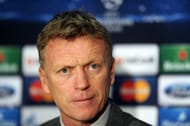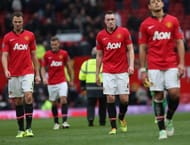When Manchester United appointed David Moyes to succeed the greatest manager of all time, Sir Alex Ferguson, they surely decided to keep expectations real and offer David Moyes the luxury of a six year contract to show support. But how realistic were those expectations? Did they envisage the club to be sitting mid table at the start of December? The lowest expectation from Moyes was the top four or there about. And 15 games in, United are 7 points adrift of the top four and 13 points away from the leaders. This is the same team that won the league by 11 points. That is some read.
So the tabloids are mounting more and more pressure on David Moyes. And why should they not. He has taken over the ‘most popular’ football club in the world, with the third largest revenue and he is expected to deliver. There are those who have said about the transition period. But does a manager at top clubs like Real Madrid, Barcelona or Bayern Munich expect to get a couple of season long transition period? So why should Moyes deserve this luxury?
Much can be said to glorify Sir Alex Ferguson but his final league winning team was one of the worst winners in Manchester United history, and it was individual brilliance and Ferguson’s drive that along with everyone else’s failure allowed Manchester United to win the league. But the absence of the midfield would come back to haunt United some day. Ferguson’s faith in a developing Tom Cleverley and strong minded desire to sign Robin van Persie had continued to neglect the positions of the squad that United really lacked. Wayne Rooney was playing out of position in the midfield to paper those cracks.
But the cracks kept growing with Michael Carrick‘s injury and presently the Manchester United’s midfield has just gone missing. The wingers are also a shadow of their formal self. Moyes needs time to make the changes needed to get a functioning midfield. He needs a few transfer windows. But failures like Fellaini are not likely to help. He needs to find replacements for Evra, Vidic and Ferdinand. He needs to build on the core of players that he has and that needs time.
But the debate lies in Moyes proving if he is the man for the job. Does he have a footballing philosophy? A playing style? So far Moyes’s United have put up a very poor show of both defense and attack, where results depended more on luck and prayer rather than dominance. While some would point to the few good matches that he has had, they only seem as fluctuations from the overall poor season that the team is having.
Moyes’ team plays a very boring brand of football, where passing and possession are not important and the team is exceedingly dependent on crosses from unreliable wingers. The long balls and crosses have gone up, the pass success and possession have come down. The midfield loses possession and gets easily overrun. So what is the way forward? Mourinho has a plan, Guardiola has a plan, Klopp has a plan, Wenger has a plan, Rodgers has a plan and even Redknapp or Lambert or Laudrup have plans. But does David Moyes have plans for his team, with the average performance of every player (barring Rooney) going down? Is this the philosophy we should accept to take Manchester United forward?
The rise in niggling injuries in the squad can be linked directly to the rigorous fitness regime under Moyes. With several key members of the squad ageing Moyes’ zealous attitude towards fitness seems to be doing more harm than right. The loss of Carrick, van Persie and Vidic to injury have harmed the team greatly. Moyes needs to learn to understand how to modify his training methods to benefit the team. Getting rid of Rene Meulensteen’s experience hasn’t helped. But none of the training seems to be bearing any dividends for the new coach as he fails to raise the spirits despite key moments. Following the victory against Arsenal, he should have got the season kicked off. But the kick never came. On the pitch the performances remained poor.
While some supporters of Moyes have pointed fingers at the players and their lack of commitment and form for the team’s failure, the final blame must rest on Moyes. He has failed to get the best out of his players. Those who have performed have done so inconsistently. These are indicators that the new manager is yet to impress himself upon the team. He is unable to get the best out of his players and he should take the blame for it. He still doesn’t know who his best players are and the consistent injury list adds to the lack of momentum for performances to build up.
The fear of not qualifying for Champions League seems very realistic and is one fate that must be avoided at all costs. A failure would also mean failure to attract top players. Some of the established stars (Wayne Rooney) or rising stars (David De Gea or Adnan Januzaj) might look for greener pastures if they are deprived of competition at the top. Why should world class players sacrifice for the failures of a not-so-world-class manager? With such failure would also come a dip in revenue which culminating with the debt would weigh down on United’s abilities to compete to attract players to the club. Also for the new manager, signings like Fellaini would not help much.
So as things stand the Moyes Experiment must start to show shoots of recovery to meet the minimum requirement at a club of United’s stature. A failure can break the club and make the club test its resolve to bide time. Moyes needs to show that he is the man to take the Manchester United story forward and moaning about tough fixtures and begging for transition time is not going to help. The fans would soon turn against him if the tide doesn’t turn and soon something might snap. Then the promise of time given by a six year contract would only remain a well meaning gesture on the part of the club. But Moyes surely must realize that he has to do a lot to convince; for up until now, the experiment has been a failure.


